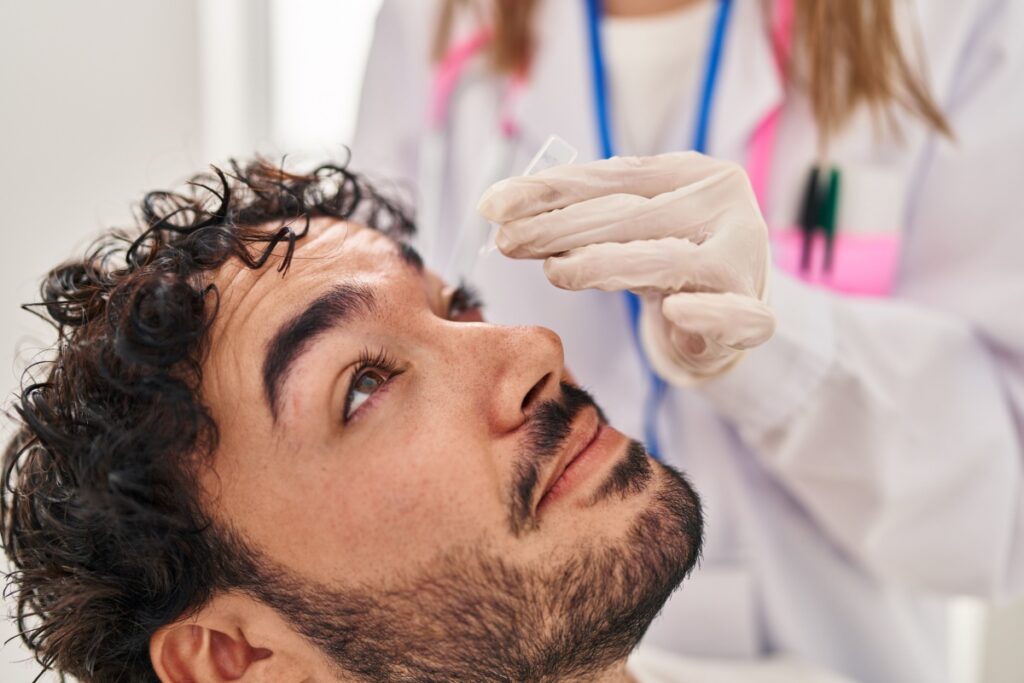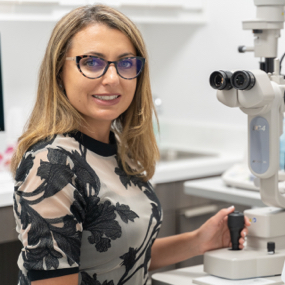With warmer weather comes more outdoor fun, but if you’re someone with seasonal allergies, this is one aspect of summer that can feel dreadful.
A runny nose and constant watery eyes can turn an otherwise beautiful day into an uncomfortable battle between having fun and managing your allergies. Rubbing your itchy and swollen eyes might bring temporary relief, but in reality, it can cause more issues.
Allergies can absolutely cause or contribute to dry eyes. After exposure to an allergen, inflammation from the body’s immune response can lead to pesky dry eye symptoms.
Don’t let allergies get in the way of your fun. In-office dry eye therapies can help you enjoy your summer without worry.
Allergies & Your Eyes
Constant environmental exposure makes your eyes particularly vulnerable to seasonal (or year-round) allergens like pollen, dust, and pet dander.
When allergens come into contact with your eyes, your body’s immune system releases histamines, a chemical that causes inflammation and irritation. This is what leads to the telltale symptoms of redness, itchiness, a runny nose, and swelling.
But there’s a catch.
Allergic reactions often lead to increased tear production (think watery eyes), which may sound like the opposite of dryness. These tears, however, are mostly water and lack the oils produced by your meibomian glands. Without these oils, your tears evaporate too quickly from the eye’s surface, resulting in insufficient lubrication and, ironically, dry eyes.
If you already struggle with dry eyes, allergies can exacerbate the condition, throwing your tear film off balance and worsening symptoms like grittiness and burning sensations.
Since dry eye and allergic reactions often share symptoms, it can be tricky to tell them apart. That said, some common signs of allergy-related dry eye include:
- Redness
- Itchiness
- Swelling and inflammation
- Constant irritation and burning sensation
- Excessive watering, followed by periods of dryness
- A gritty feeling, as if there’s something stuck in your eye
Dry eyes can be irritating and uncomfortable, but they don’t cause sneezing, a runny nose, or nasal congestion. If you experience these symptoms along with itchy, red, or watery eyes, allergies are most likely to blame.
Dry Eye Therapies for Allergy Relief
Despite your best efforts, allergy-related dry eye symptoms can persist. When over-the-counter solutions can’t provide the relief you’re after, it may be time to explore in-office dry eye therapies.
Tackling allergy-related dry eyes is a multi-step process. At Brantford Eye Care, we adopt a comprehensive approach to dry eye management.
These treatments aim to restore moisture, reduce inflammation, and stabilize the tear film. Here’s a closer look at some therapies we offer:
- Intense Pulsed Light (IPL) Therapy: Beyond helping with dry eye that stems from meibomian gland dysfunction, IPL reduces inflammation triggered by allergies, breaking the cycle of irritation and discomfort.
- Nutritional Support with Omega-3 Supplements: Quality omega-3 supplements in their triglyceride form can support healthy tear production and combat inflammation, significantly improving eye comfort.
- Allergy Management Strategies: We may recommend additional measures, such as prescription medications or lifestyle adjustments to limit allergen exposure.
Dry eye therapy focuses on sustainable results. A blend of custom treatments and ongoing support from our team helps break the cycle of flare-ups, so you can enjoy clearer, comfortable vision without irritation.
Most importantly, wash your hands, avoid touching your eyes, and please don’t rub your eyes for relief. These simple steps can make a noticeable difference in managing allergy-related dry eyes.

Can Antihistamines Worsen Dry Eyes?
Here’s where things get tricky.
Many people rely on antihistamines to fight allergy symptoms, and while they’re often effective, they can come with an unintended side effect: dry eyes.
Antihistamines work by blocking histamines, which reduces allergic symptoms like watery eyes. However, they also decrease overall tear production, leaving your eyes vulnerable to dryness and irritation.
You don’t have to swear off antihistamines to protect your eyes. Instead:
- Use preservative-free artificial tears to add extra moisture to your eyes throughout the day.
- Ask your eye doctor to switch to allergy eye drops.
- Pair your antihistamines (if your eye doctor approves) with in-office dry eye therapies to manage both conditions.
If dry, itchy eyes are getting in the way of life, professional care can give you the solution you need.
Protect Your Eyes & Reclaim Comfort
Dry eyes from allergies might seem like a double whammy, but relief is possible.
You can enjoy better eye comfort year-round when you understand how allergies aggravate dry eyes. Along with allergy management, dry eye therapies can provide lasting relief.
An accurate diagnosis is the first step.
With modern technology and diagnostic tools, our team evaluates the severity of your symptoms, identifies underlying causes, and examines the overall health of your tear film. This precision allows us to create a custom treatment plan that aligns perfectly with your needs. Fight back against allergies and book an initial consultation with our team at Brantford Eye Care. Connect with us today!




